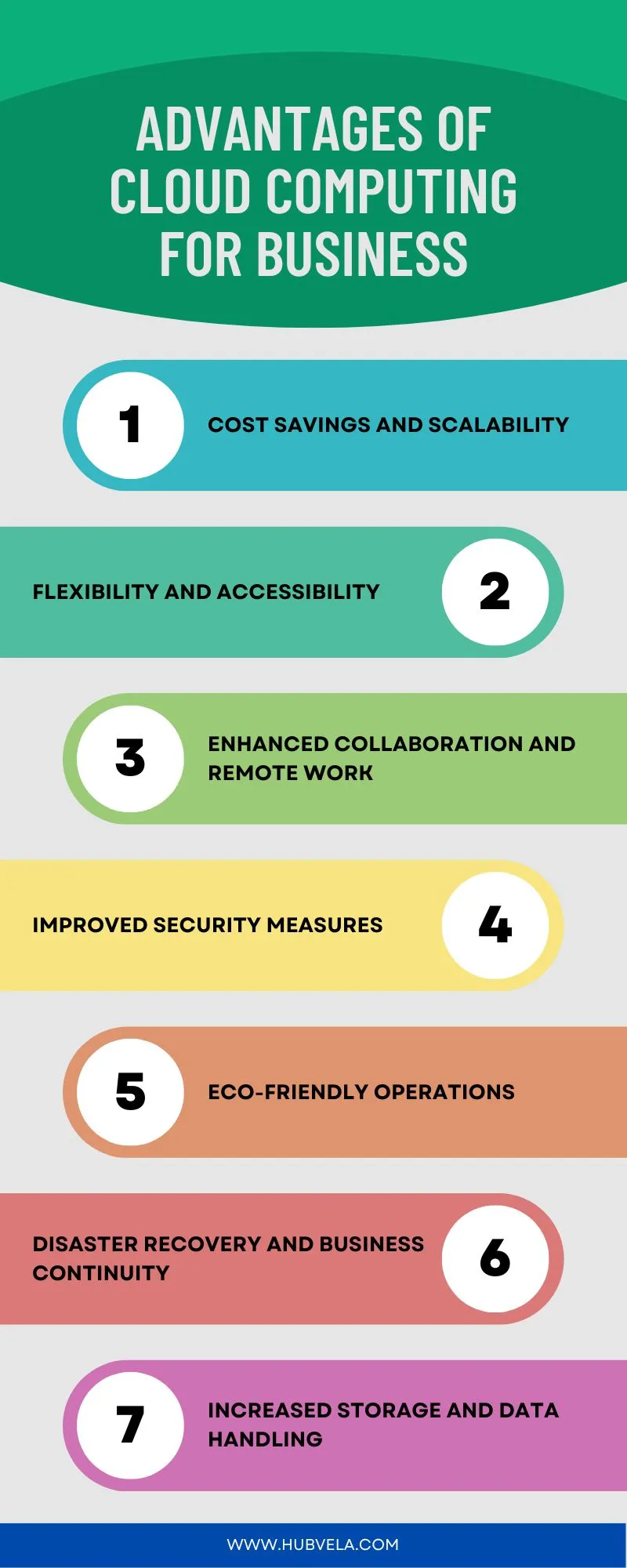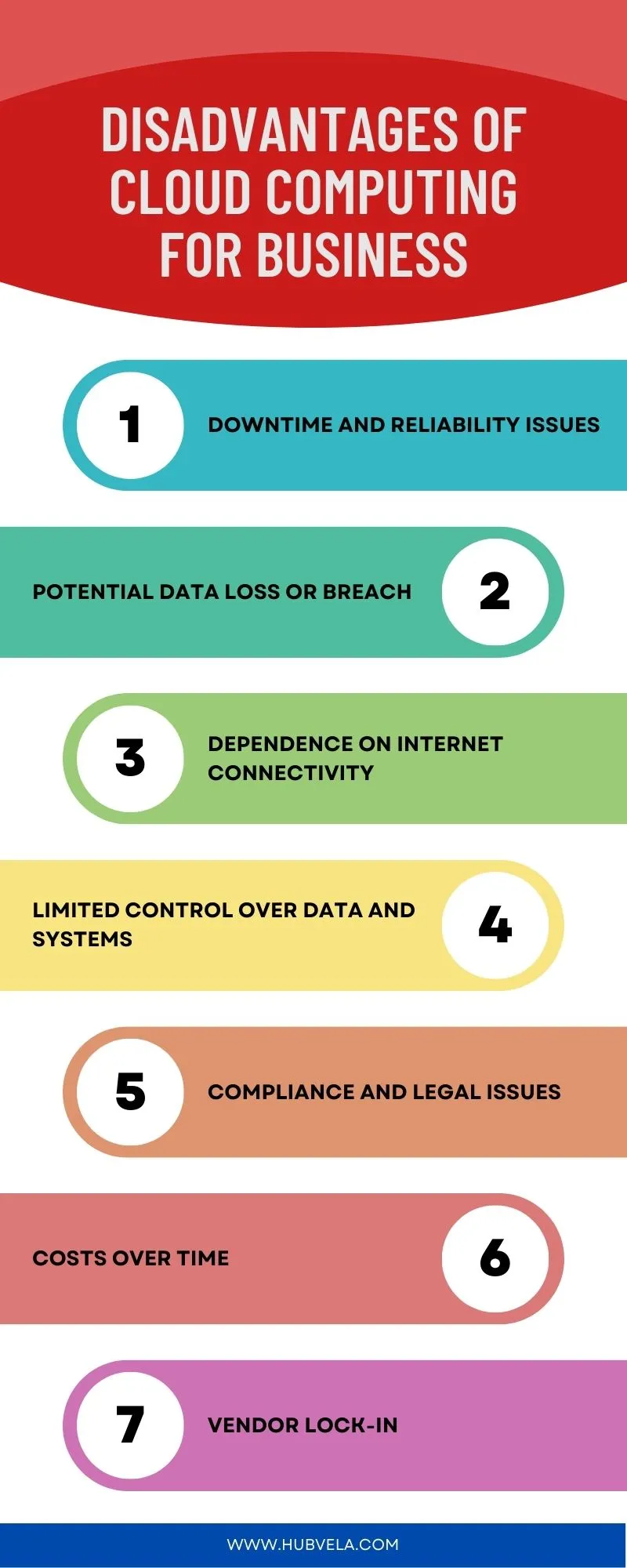Cloud computing has become increasingly popular in recent years, with many businesses adopting the technology to improve their operations.
Cloud computing refers to the delivery of hosted services over the Internet, often on a pay-as-you-go basis. This technology offers many advantages, including cost savings, scalability, accessibility, disaster recovery, and flexibility.
However, like any technology, cloud computing also has its disadvantages, such as security risks, dependence on internet connectivity, limited control, compliance issues, and data portability.
In this article, we will explore the advantages and disadvantages of cloud computing for businesses.

--Advertisement--
Advantages of Cloud Computing for Business
Cloud computing has become an integral part of modern business operations, offering a wide range of advantages for organizations. From cost savings to enhanced security, the benefits of cloud computing are numerous and impactful.
In today’s ever-changing business landscape, small and large businesses alike can leverage cloud computing to improve collaboration, access data from anywhere, and streamline their operations. Let’s delve into the key advantages of cloud computing for businesses.

1. Cost Savings and Scalability
One of the key advantages of cloud computing for businesses is cost savings and scalability. Once a business is on the cloud, easy access to its data will save time and money in project startups.
Most cloud computing services are pay-as-you-go, which means that businesses only pay for what they use, and they can easily scale up or down their resources to meet their needs.
This flexibility can make a significant difference to the overall efficiency of an organization. Additionally, cloud-based platforms can help businesses save time and money by boosting productivity, improving collaboration, and promoting innovation.
2. Flexibility and Accessibility
Flexibility and accessibility are key advantages of cloud computing for businesses. Cloud computing enhances accessibility to information resources, thereby fueling functionality, promoting collaboration, and fostering innovation.
It allows users to scale services to fit their needs, customize applications, and access cloud services from anywhere with an internet connection.
Additionally, cloud infrastructure scales IT resources on demand to support fluctuating workloads, providing businesses with the flexibility to scale up and down quickly and easily without disruption or downtime.
This scalability is a significant benefit of cloud technology, allowing businesses to adjust rapidly according to variations and requirements.
Furthermore, the cloud enables organizations to act quickly and with agility, allowing them to spin up and down workloads as needed, which is ideal for businesses that experience seasonal spikes in demand.
The flexibility and accessibility offered by cloud computing empower businesses to adapt to changing needs, improve collaboration, and optimize their investments.
3. Enhanced Collaboration and Remote Work
Enhanced Collaboration and Remote Work are key advantages of cloud computing for businesses. Cloud-based platforms enable employees to access data and applications from anywhere, promoting seamless collaboration and remote work capabilities.
This flexibility allows for improved work-life balance and higher staff retention, as employees can access work documents on the go using their smartphones or tablets.
Additionally, cloud computing facilitates decentralized collaboration, enabling teams to work more flexibly and efficiently.
The ability to access customer information and share data with authorized parties from any location in the world enhances collaboration and productivity.
Furthermore, cloud computing promotes remote work by providing easy access to company data, saving time and money in project startups, and allowing for increased scalability to meet the demands of remote work environments.
Cloud computing offers businesses the opportunity to enhance collaboration and support remote work, ultimately leading to improved efficiency and productivity.
4. Improved Security Measures
Improved Security Measures in cloud computing for business offer several advantages. Research shows that 94% of businesses that switched to the cloud have seen an improvement in security, and 91% say the cloud makes compliance easier to manage.
The key to this enhanced security is the encryption of data being transmitted over networks and stored in databases, making information less accessible by hackers or unauthorized individuals.
This heightened security can provide businesses with peace of mind and help them meet government compliance requirements more easily.
Additionally, cloud computing can help businesses save time and money by boosting productivity, improving collaboration, and promoting innovation.
The improved security measures in cloud computing contribute to a more efficient and secure business environment.
5. Eco-Friendly Operations
Eco-friendly operations in the context of cloud computing refer to the environmental advantages that businesses can achieve by leveraging cloud services.
Cloud computing offers several eco-friendly benefits, such as reduced energy consumption, lower carbon emissions, and minimized hardware waste.
By migrating to the cloud, businesses can decrease their reliance on physical infrastructure, leading to a smaller carbon footprint. Additionally, the scalability and resource efficiency of cloud services contribute to energy savings and environmental sustainability.
Furthermore, the remote accessibility of cloud-based systems reduces the need for extensive business travel, thereby lowering fuel consumption and greenhouse gas emissions.
Embracing cloud computing can significantly contribute to eco-friendly operations by promoting energy efficiency and environmental responsibility.
6. Disaster Recovery and Business Continuity
Disaster recovery and business continuity are two important advantages of cloud computing for businesses. In the event of a disaster, such as a natural disaster or cyber attack, cloud computing allows businesses to quickly recover their data and systems.
This is because cloud providers typically have multiple data centers in different locations, which means that if one data center goes down, the data and applications can be quickly switched to another data center.
Additionally, cloud computing allows businesses to continue their operations even in the event of a disaster, as employees can access their work from anywhere with an internet connection.
This means that businesses can continue to serve their customers and generate revenue even during a crisis.
7. Increased Storage and Data Handling
One of the advantages of cloud computing for businesses is increased storage and data handling. Once a company’s data is on the cloud, it can be accessed easily from anywhere, saving time and money in project startups.
Additionally, cloud-based services can meet the demand for extra bandwidth instantly, rather than undergoing a complex and expensive update to the IT infrastructure.
This improved freedom and flexibility can make a significant difference to the overall efficiency of an organization.
Furthermore, cloud computing can help businesses save time and money by boosting productivity, improving collaboration, and promoting innovation.
Disadvantages of Cloud Computing for Business
Cloud computing has become increasingly popular among businesses due to its scalability, flexibility, and cost-effectiveness.
However, there are also several disadvantages of cloud computing that businesses should consider. We will explore the disadvantages of cloud computing for businesses.
Some of the key disadvantages include downtime, limited control and visibility, security concerns, and hidden costs.

1. Downtime and Reliability Issues
One of the disadvantages of cloud computing for businesses is downtime and reliability issues. Since cloud computing services are internet-based, service outages are always a possibility and can occur for any reason.
Technical problems such as reboots, network outages, and downtime can incapacitate businesses and cause significant disruptions.
Moreover, businesses have limited control and visibility over the infrastructure owned by cloud service providers, which can be a concern when they feel too far removed and with little control.
While an internet interruption won’t destroy or compromise data stored in the cloud, it can still prevent businesses from accessing their data for the duration of the outage.
2. Potential Data Loss or Breach
One of the main disadvantages of cloud computing for businesses is the potential for data loss or breach. Since businesses store their data on remote servers, they are reliant on the cloud service provider to keep their data secure.
If the provider experiences a security breach or data loss, the business’s data could be compromised or lost. Additionally, businesses may have limited control and visibility over their data since the infrastructure is owned by the cloud service provider.
This can be a concern for businesses that need to comply with data privacy regulations or have sensitive data that they need to keep secure.
Therefore, businesses need to carefully evaluate the security measures of their cloud service provider and ensure that they have backup and recovery plans in place to mitigate the risk of data loss or breach.
3. Dependence on Internet Connectivity
When it comes to the “Dependence on Internet Connectivity” as a disadvantage of cloud computing for businesses, it is important to consider the potential impact of relying on Internet access for accessing cloud services.
Businesses that heavily depend on cloud computing are vulnerable to downtime and service interruptions if their internet connection fails. This can lead to disruptions in operations, loss of productivity, and hindered access to critical applications and data.
Additionally, the reliance on internet connectivity can pose security risks, as businesses need a stable and secure internet connection to ensure the protection of their data and applications stored in the cloud.
Therefore, the dependence on internet connectivity can be a significant drawback for businesses utilizing cloud computing, requiring them to carefully consider their internet infrastructure and contingency plans to mitigate potential disruptions.
4. Limited Control Over Data and Systems
Limited control over data and systems is a significant disadvantage of cloud computing for businesses.
When a company opts for cloud services, the infrastructure is owned and managed by the cloud service provider, which can lead to concerns about the level of control and visibility the business has over its data and systems.
This lack of direct control can be a source of unease for businesses, as they may feel too removed from their own infrastructure.
Additionally, the reliance on the Internet for accessing cloud applications and services means that any internet outage can disrupt access to critical systems and data, further highlighting the limited control businesses have over their operations when utilizing cloud computing.
5. Compliance and Legal Issues
One of the disadvantages of cloud computing for businesses is compliance and legal issues. Since cloud service providers own the infrastructure, businesses may have limited control and visibility over their data, which can be a concern when it comes to compliance with regulations and laws.
For example, some industries have strict regulations regarding data privacy and security, and businesses must ensure that their cloud service provider complies with these regulations.
Additionally, businesses may face legal issues if their cloud service provider experiences a data breach or if there is a dispute over ownership or access to data stored in the cloud.
Therefore, businesses must carefully consider the compliance and legal implications of using cloud computing and ensure that they have appropriate measures in place to mitigate any risks.
6. Costs Over Time
Cloud computing offers several advantages for businesses, such as reduced IT expenses, improved flexibility, and scalability. However, one of the notable disadvantages of cloud computing is the potential cost concerns.
While it can help small businesses access quality services without investing in large IT infrastructure, there are hidden costs involved, including data transfer, cloud utilization, and data migration costs, which may emerge at a later stage.
Additionally, businesses may end up spending large sums of money on data security and training employees to use cloud integration services, impacting their overall expenditure.
It’s important for businesses to carefully consider these cost implications and factor them into their budget when evaluating cloud computing as an option for their operations.
7. Vendor Lock-in
Vendor lock-in is a significant concern in cloud computing, particularly for businesses.
It refers to the situation where a company becomes overly dependent on a specific cloud provider, making it challenging to switch to another provider without incurring substantial costs, experiencing business disruptions, or facing technical incompatibilities.
This issue arises due to the lack of standardization in cloud computing, making it difficult for businesses to move databases once they are set up, especially during cloud migration.
Vendor lock-in can limit flexibility, as organizations may find it challenging to migrate their services from one vendor to another, leading to additional costs and configuration complexities.
To mitigate the risk of vendor lock-in, businesses can adopt practices such as utilizing standards-based solutions and employing a multi-cloud strategy to avoid being locked into a single provider.
By understanding the potential effects of vendor lock-in and implementing preventive measures, businesses can navigate the disadvantages of cloud computing and make informed decisions to safeguard their operations.
Conclusion on Advantages and Disadvantages of Cloud Computing for Business
Cloud computing offers several advantages and disadvantages for businesses. The advantages include cost reduction, flexibility, scalability, data control, greater accessibility, and more effective collaboration.
Cloud services can accommodate increased usage and activity as a business grows, and they allow for on-demand purchasing with a pay-as-you-go structure, avoiding costly investments that may not serve future purposes.
On the other hand, the disadvantages of cloud computing for businesses include limited control and visibility, reliance on the internet, potential security risks, downtime, and the possibility of vendor mismatches.
While cloud computing provides support from service providers, it also means that the infrastructure is owned by the cloud service provider, leading to concerns about control and visibility.
Additionally, reliance on the internet means that an internet outage can disrupt access to applications and data stored in the cloud.
In conclusion, while cloud computing offers significant benefits such as cost savings and enhanced collaboration, businesses should carefully consider the potential drawbacks, including limited control, security risks, and reliance on internet connectivity, before fully embracing cloud-based services.


